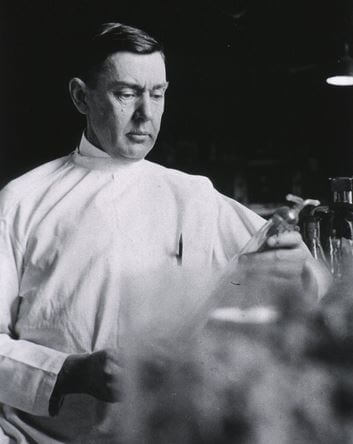![]() Elmer McCollum was a prominent American nutrition scientist of the first half of the 20th century, first at the University of Wisconsin in Madison and then at Johns Hopkins University in Baltimore.In 1908, McCollum started the first rat colony maintained for nutrition experiments in the United States, work which led to the discovery of vitamins A and D. In 1916, he introduced the use of letters to name what would become known as vitamins. His book “The Newer Knowledge of Nutrition” through five editions taught a generation of scientists. And he served on many government boards and panels and international nutrition organizations.However, there was apparently a nasty side to McCollum.
Elmer McCollum was a prominent American nutrition scientist of the first half of the 20th century, first at the University of Wisconsin in Madison and then at Johns Hopkins University in Baltimore.In 1908, McCollum started the first rat colony maintained for nutrition experiments in the United States, work which led to the discovery of vitamins A and D. In 1916, he introduced the use of letters to name what would become known as vitamins. His book “The Newer Knowledge of Nutrition” through five editions taught a generation of scientists. And he served on many government boards and panels and international nutrition organizations.However, there was apparently a nasty side to McCollum.
According to vitamin A researcher Richard A. Semba of the Johns Hopkins University School of Medicine, McCollum left the University of Wisconsin for Johns Hopkins “under a cloud of ethical impropriety and academic misconduct.” According to Semba, McCollum stole the research notebooks of his colleagues, including Steenbock’s, published their data without their consent or acknowledgement, and purposely sabotaged their animal experiments. In his subsequent writings, McCollum attacked his rivals at Wisconsin, often by giving a deliberately distorted or false presentation of their achievements. Semba makes it clear that McCollum was not liked by his peers. (from: Richard A. Semba: On the ‘Discovery’ of Vitamin A. Annals of Nutrition & Metabolism. 2012; 61: 192-198.)
References:
- National Academy of Sciences Biographical Memoir
- Wikipedia biography
- Tribute by L. Emmett Holt, Jr.
- Nutritional Biochemistry and the Discovery of Vitamins
- McCollum house in Baltimore a National Historic Landmark
- full text of McCollum’s The newer knowledge of nutrition: the use of food for the preservation of vitality and health (1918)
